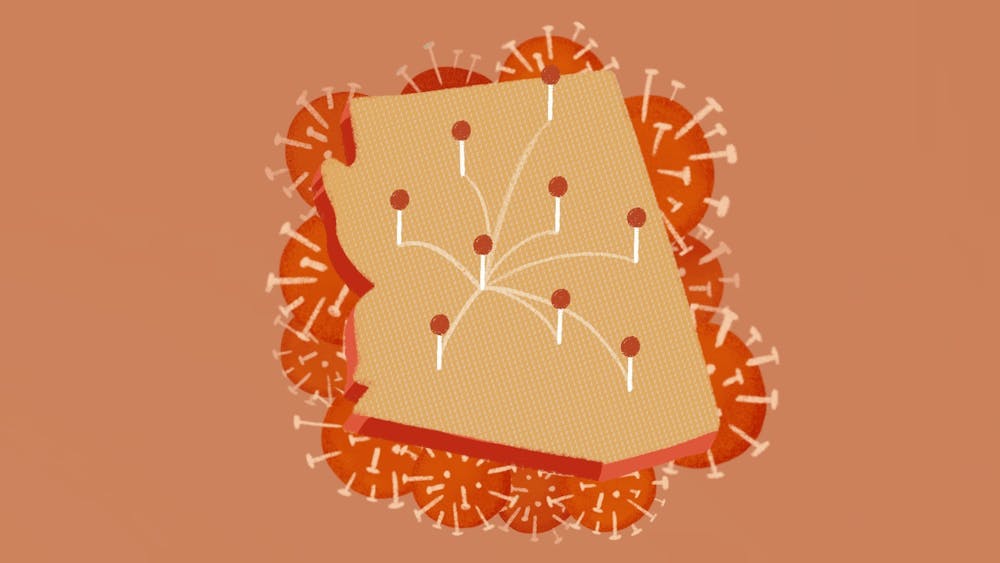An ASU COVID-19 case investigation team is working to provide contact tracing and resources to people across the state who test positive for the coronavirus.
The team, composed of ASU students, faculty and community volunteers, has been working since June to track potential coronavirus spread and connect community members to the resources they need.
"We've trained over 300 case investigators and contact tracers, and we have closed out 30,000 cases for Maricopa County and completed over 15,000 case investigations," said Megan Jehn, an epidemiologist and associate professor at the School of Human Evolution and Social Change who helps lead the team.
Contact tracing, the process of following the potential chain of transmission of a virus, involves identifying the potential source of exposure, obtaining a list of close contacts and learning the duration of potential exposure to others, according to the Centers for Disease Control and Prevention.
Case investigations look at socio-economic demographics, possible health concerns and other factors to assess situations and provide necessary resources to the infected individuals, team members said.
When individuals test positive for COVID-19, the Maricopa County Department of Public Health reaches out to inform them of the positive results. The county then passes the data along to case investigators, who call the infected individuals to learn more and provide resources, such as guidelines from the CDC and information on how to self-isolate.
Although the vast majority of contact tracing in the county is done by the Crisis Response Network's 2-1-1 Arizona program, ASU's collaborative team does case investigations and supplemental contact tracing, said Michael Shafer, a professor at the School of Social Work.
John Luce, a sophomore studying biochemistry and global health, was in one of the first volunteer cohorts last June. In the fall semester, he worked as a contact tracer for internship credit in the course ASB 484.
"Our day-to-day is, we're calling these cases and we're trying to figure out what are their symptoms? How has it progressed? And also, just how COVID is spreading in the community," Luce said. "We're really just trying to gather as much data as we can to help inform public health policy and shape guidelines."
Although the case investigation team primarily works remotely, the group does have a field epidemiology team on the ground in Guadalupe, Arizona. The team goes door to door in order to reach individuals who may not have access to resources over the phone, Jehn said.
"Reaching every contact matters if we're going to break chains of transmission, and that's especially true for the hard-to-reach cases," Jehn said.
Case investigators, working both in the field and remotely, undergo training developed by staff at the School of Social Work, focusing on communicating empathetically with the people they interact with.
"Research has shown when you can interact with individuals empathically, you're much more likely to get a positive reaction and a positive response from individuals," Shafer said. He said from a public health standpoint, "that's exactly what needs to happen."
Shafer said taking an epidemiological and a social approach to case investigations is critical, as the "disciplines complement one another."
Epidemiologists focus on how the disease itself spreads, while social workers are able to communicate the necessary information about health to the public, Shafer said.
"Social work comes with a more multi-systems perspective, understanding that responding effectively to the COVID-19 epidemic is going to require social support services to support people and to encourage people to do the things that you need them to do," Shafer said.
Luce, who completed the training developed in part by the School of Social Work, said working on case investigations has improved his phone interviewing skills and taught him that empathy, above all else, is key.
"When you hear someone's reaction on the phone, you have no idea what they're really going through," Luce said. "It taught me that you really have to be empathetic on the phone all the time."
Jehn and Shafer hope the opportunity students have to work as case investigators can increase their understanding of the public health sphere, whether they are interested in epidemiology, social work or any other field.
"Just knowing that you were able to help in some capacity and make a difference in someone's life during this time is just, I think, one of the best feelings you could have," Luce said.
Reach the reporter at alcamp12@asu.edu and follow @Anna_Lee_Camp on Twitter.
Like The State Press on Facebook and follow @statepress on Twitter.
Continue supporting student journalism and donate to The State Press today.
Continue supporting student journalism and
donate to The State Press today.




